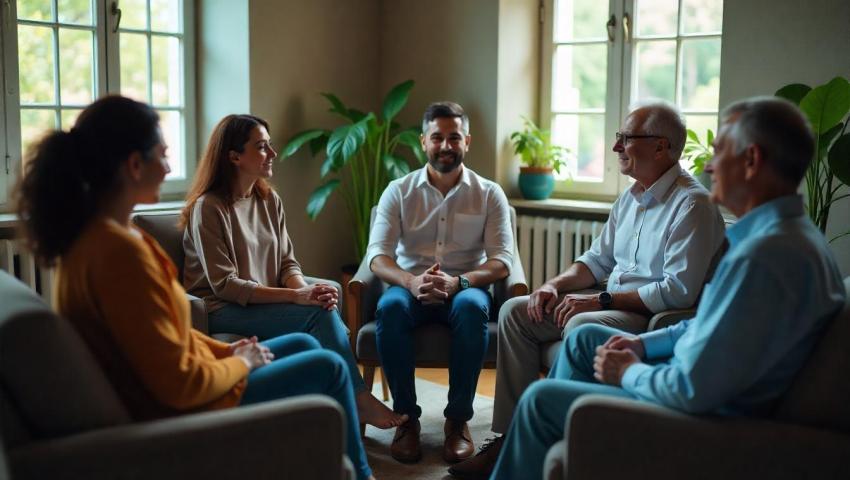
Group Therapy: The Power of Shared Experience
Group therapy is a form of psychotherapy where multiple individuals come together in a therapeutic setting to discuss their challenges, share experiences, and offer mutual support. It offers a sense of community and shared understanding, helping individuals realize that they are not alone in their struggles, while fostering emotional healing and personal growth.
Group therapy is an established and widely used therapeutic modality that fosters healing through the power of shared experience. It is designed to provide a space where individuals come together in a safe, structured environment to discuss their personal challenges, learn from each other’s experiences, and receive emotional support. With the guidance of a licensed therapist, participants explore their thoughts, behaviors, and feelings, allowing them to gain new insights into their struggles and develop healthier coping mechanisms.
This unique therapeutic approach leverages the power of social connection and mutual support, enabling individuals to realize that they are not alone in their journey. Group therapy creates an environment where people with shared experiences—whether related to anxiety, depression, trauma, addiction, or interpersonal struggles—can come together to heal collectively. By engaging with others who understand their challenges, participants can experience profound emotional validation, which is a powerful catalyst for growth and recovery.
The Core Benefits of Group Therapy
Group therapy offers several key benefits that make it a highly effective form of psychotherapy. It goes beyond traditional one-on-one therapy by providing participants with a range of interpersonal experiences and perspectives. Some of the primary benefits include:
- Shared Experience and Emotional Validation
A core benefit of group therapy is the sense of shared experience it fosters. Many people dealing with mental health challenges, such as anxiety, depression, trauma, or addiction, often feel isolated and disconnected from others. Group therapy breaks through that isolation by allowing participants to connect with others who are going through similar struggles. This shared experience is deeply validating and helps reduce feelings of loneliness, shame, and stigma. By hearing others talk openly about their challenges, participants often feel less alienated and more empowered to confront their own issues. - Mutual Support and Feedback
Group therapy provides an opportunity for participants to give and receive support in a way that individual therapy cannot. The mutual support that develops within the group is incredibly powerful. Group members share insights, offer advice, and provide encouragement, creating a collaborative environment where everyone contributes to each other’s healing. Feedback from peers can often resonate more deeply than feedback from a therapist alone, as it comes from people who have faced similar difficulties. This dynamic fosters a sense of community and belonging, which is essential for emotional healing. - Improved Social and Communication Skills
For individuals who struggle with social anxiety, low self-esteem, or interpersonal relationship difficulties, group therapy is an ideal setting to practice and develop social skills. The group environment provides a safe space to engage in meaningful conversations, express emotions, and interact with others in a constructive way. As participants navigate group dynamics, they learn to improve their communication, active listening, and conflict resolution skills. These social skills not only enhance their relationships within the group but also carry over into their everyday lives, improving interactions with family, friends, and colleagues. - Multiple Perspectives and New Insights
One of the unique advantages of group therapy is the diversity of perspectives it offers. In individual therapy, participants work with one therapist who provides feedback and guidance. However, in a group setting, participants hear multiple viewpoints and insights from their peers, which can lead to new ways of thinking and problem-solving. For example, someone in the group may share a coping strategy or perspective that another participant had not considered, offering new avenues for personal growth. This exchange of ideas helps individuals challenge their own thought patterns, gain deeper self-awareness, and develop more adaptive ways of coping with stress. - Accountability and Motivation
Group therapy fosters a sense of accountability that is often missing in individual therapy. When participants share their goals and progress with the group, they are more likely to stay committed to their therapeutic work. Knowing that others in the group are invested in their success provides motivation to continue working on their personal challenges, even when progress feels slow. Additionally, witnessing the growth and progress of other group members can be incredibly inspiring, reinforcing the belief that change is possible. - Cost-Effective Therapy Option
Group therapy is often more affordable than individual therapy, making it an accessible option for people who may not have the financial means to pursue one-on-one counseling. Despite being a more cost-effective option, group therapy still offers many of the same benefits as individual therapy, with the added advantage of peer support and social interaction.
Different Types of Group Therapy
Group therapy can take many forms, depending on the therapeutic goals and the specific needs of the participants. Some common types of group therapy include:
- Psychoeducational Groups
These groups focus on educating participants about specific mental health conditions or challenges. For example, a psychoeducational group might focus on teaching participants about anxiety, depression, or stress management techniques. The therapist provides information and guidance, while group members discuss how these topics relate to their own lives. The goal is to empower participants with knowledge and tools they can use to manage their mental health more effectively. - Support Groups
Support groups are typically less structured than psychoeducational groups and are designed to provide a space for participants to share their experiences and offer mutual support. These groups often focus on specific issues, such as grief, addiction recovery, or coping with chronic illness. The therapist or facilitator helps guide the conversation but allows the group members to take the lead in sharing their experiences and offering encouragement. - Process-Oriented Groups
Process-oriented groups focus on exploring the emotional and relational dynamics that unfold within the group itself. Participants are encouraged to reflect on their thoughts, feelings, and behaviors in real-time as they interact with others. This type of group therapy is especially helpful for individuals who struggle with interpersonal relationships, as it allows them to gain insight into their relational patterns and develop healthier ways of interacting with others. - Cognitive Behavioral Therapy (CBT) Groups
CBT groups are structured around teaching participants how to identify and challenge unhelpful thought patterns that contribute to mental health issues like anxiety and depression. Group members learn practical skills for managing their thoughts, emotions, and behaviors, while supporting each other in applying these skills to real-life situations. CBT groups are often time-limited and goal-oriented, focusing on specific therapeutic outcomes. - Addiction Recovery Groups
Addiction recovery groups, such as Alcoholics Anonymous (AA) or Narcotics Anonymous (NA), provide a supportive environment for individuals working to overcome substance use disorders. These groups often follow a structured program that encourages participants to share their struggles, offer mutual support, and hold each other accountable in their recovery journey.
The Role of the Therapist in Group Therapy
In group therapy, the therapist plays a crucial role in creating and maintaining a safe and supportive environment. The therapist facilitates discussions, sets boundaries, and ensures that all group members have the opportunity to share and participate. They may also introduce specific therapeutic interventions or guide the group toward a particular topic, depending on the group's needs.
While the therapist provides structure, group therapy is often less directive than individual therapy. The focus is on the interactions between group members, and the therapist takes on a more facilitative role, encouraging participants to explore their thoughts and emotions within the context of the group. This approach allows for a collaborative, peer-driven experience that promotes collective healing and growth.
Common Challenges in Group Therapy
Like any therapeutic approach, group therapy presents certain challenges that participants and therapists must navigate. Some of the most common challenges include:
- Fear of Vulnerability
Many individuals feel apprehensive about sharing their personal struggles in a group setting. The fear of being judged or misunderstood can be a significant barrier to participation. Therapists work to create a non-judgmental and supportive atmosphere where participants feel safe to express themselves. - Group Dynamics and Conflicts
Group therapy involves multiple personalities, and conflicts may arise as participants navigate their interpersonal dynamics. The therapist plays an important role in managing these dynamics and ensuring that the group remains respectful and cohesive. - Balancing Individual and Group Needs
Group therapy must balance the needs of individual participants with the goals of the group as a whole. Therapists need to be attuned to both individual experiences and the collective progress of the group, ensuring that all participants feel heard and supported.
Conclusion
Group therapy is a powerful therapeutic approach that harnesses the healing potential of social connection and shared experience. By providing a safe and supportive environment where individuals can share their struggles, receive feedback, and offer mutual support, group therapy fosters emotional growth, resilience, and self-awareness. Whether focused on mental health, addiction recovery, or personal growth, group therapy offers participants a unique opportunity to heal within a community of peers.
For many, the strength and solidarity found in group therapy can be life-changing, offering not only emotional support but also a renewed sense of hope and motivation. As participants navigate their personal journeys together, they build lasting connections, gain new insights, and ultimately emerge stronger, more self-aware, and better equipped to face life’s challenges.



